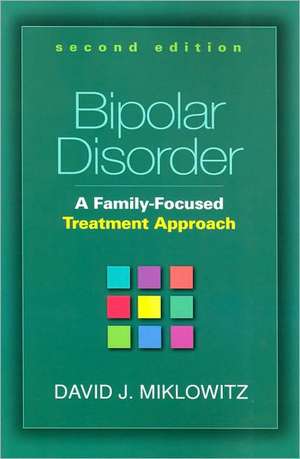Bipolar Disorder, Second Edition: A Family-Focused Treatment Approach
Autor David J. Miklowitzen Limba Engleză Paperback – 20 apr 2010
Family-focused psychoeducational treatment (FFT) is among a very small number of psychosocial treatments that have been found to be effective in multiple studies to improve the course of bipolar disorder. This indispensable guide describes how to implement FFT with adult and adolescent patients and their family members. Provided are practical procedures for helping families understand the nature of bipolar disorder, strengthen their communication skills, solve day-to-day problems, and reduce the risk and severity of relapse. The book incorporates state-of-the-art knowledge on the illness and its biological and psychosocial management. More than a dozen reproducible handouts are included.
Preț: 218.02 lei
Preț vechi: 296.82 lei
-27% Nou
Puncte Express: 327
Preț estimativ în valută:
41.72€ • 43.04$ • 34.81£
41.72€ • 43.04$ • 34.81£
Comandă specială
Livrare economică 06-20 martie
Doresc să fiu notificat când acest titlu va fi disponibil:
Se trimite...
Preluare comenzi: 021 569.72.76
Specificații
ISBN-13: 9781606236451
ISBN-10: 1606236458
Pagini: 348
Dimensiuni: 152 x 229 x 25 mm
Greutate: 0.5 kg
Ediția:2
Editura: Guilford Publications
Colecția Guilford Press
ISBN-10: 1606236458
Pagini: 348
Dimensiuni: 152 x 229 x 25 mm
Greutate: 0.5 kg
Ediția:2
Editura: Guilford Publications
Colecția Guilford Press
Public țintă
Professional Practice & DevelopmentCuprins
I. Bipolar Disorder and Families: Clinical and Research Background
1. Bipolar Disorder: Why Family Treatment?
2. The Nature of Bipolar Disorder and Its Impact on the Family
3. Family and Social Factors in the Course of Bipolar Disorder
II. Conducting Family-Focused Treatment
4. Planning the First Encounter
5. The Functional Assessment
6. Family Psychoeducation: The Initial Sessions
7. Family Psychoeducation: Etiology, Treatment, and Self-Management
8. Family Psychoeducation: Dealing with Resistances
9. Communication Enhancement Training: Rationale and Mechanics
10. Communication Enhancement Training: Clinical Issues
11. Dealing with Family Problems
12. Managing Crises in Family-Focused Treatment
13. Termination
1. Bipolar Disorder: Why Family Treatment?
2. The Nature of Bipolar Disorder and Its Impact on the Family
3. Family and Social Factors in the Course of Bipolar Disorder
II. Conducting Family-Focused Treatment
4. Planning the First Encounter
5. The Functional Assessment
6. Family Psychoeducation: The Initial Sessions
7. Family Psychoeducation: Etiology, Treatment, and Self-Management
8. Family Psychoeducation: Dealing with Resistances
9. Communication Enhancement Training: Rationale and Mechanics
10. Communication Enhancement Training: Clinical Issues
11. Dealing with Family Problems
12. Managing Crises in Family-Focused Treatment
13. Termination
Notă biografică
David J. Miklowitz, PhD, is Distinguished Professor of Psychiatry and Biobehavioral Sciences at the Semel Institute for Neuroscience and Human Behavior, David Geffen School of Medicine, University of California, Los Angeles, and Visiting Professor in the Department of Psychiatry at the University of Oxford, United Kingdom. He is author of The Bipolar Disorder Survival Guide and Living Well with Bipolar Disorder, for general readers, and several award-winning books for professionals, including Bipolar Disorder: A Family-Focused Treatment Approach. Dr. Miklowitz has published over 300 scientific articles and 70 book chapters. He has won Distinguished Investigator awards from the Brain and Behavior Research Foundation, the Depression and Bipolar Support Alliance, the International Society for Bipolar Disorders, and the Society for a Science of Clinical Psychology. Dr. Miklowitz is one of the few psychologists to have received the Award for Research in Mood Disorders from the American College of Psychiatrists.
Recenzii
"The second edition of Bipolar Disorder, like the first, is a major contribution to the understanding of a common, complex, painful, and too often lethal illness. Miklowitz, one of the world's leaders in the study of psychotherapeutic treatments of bipolar illness, presents clinical and research findings in a way that will be invaluable to clinicians."--Kay Redfield Jamison, PhD, The Dalio Family Professor in Mood Disorders and Professor of Psychiatry, Johns Hopkins University School of Medicine
"Among the first to embrace the idea that psychosocial interventions might be of value to those who suffer from bipolar disorder, Miklowitz continues to be a leader in the field. The second edition of Bipolar Disorder represents yet another valuable contribution to clinical practice and research. Miklowitz has added new evidence for the effectiveness of family-focused treatment for adults from a series of recently published studies. He has also added rich new material on childhood bipolar disorder and how it emerges over time within the family context, as well as more clinical material on applications for adolescents with bipolar disorder and their families. Essential reading for anyone interested in the treatment of bipolar disorder."--Ellen Frank, PhD, Western Psychiatric Institute and Clinic"This timely second edition is most welcome. Miklowitz and his colleagues have significantly advanced the field of integrated treatment for bipolar disorder. The empirical basis for a family-focused approach is now well established, and we can safely apply these treatment strategies to new populations, such as adolescents with bipolar disorder. This book will appeal to any mental health professional who wants to learn how to deliver family-focused treatment successfully."--David J. Kupfer, MD, Professor and Chair, Department of Psychiatry, University of Pittsburgh School of Medicine
This is an eminently readable book, appropriate for people living with bipolar disorder, their families and loved ones, and for clinicians who want to better understand the illness' impact on families and engage them in treatment....Dr. Miklowitz is meticulous about providing examples of the specific interventions as well as providing suggestions for adapting the intervention techniques to different settings and special populations.
--Psychiatric Rehabilitation Journal, 2/10/2010Descriere
Family-focused psychoeducational treatment (FFT) is among a very small number of psychosocial treatments that have been found to be effective in multiple studies to improve the course of bipolar disorder. This indispensable guide describes how to implement FFT with adult and adolescent patients and their family members. Provided are practical procedures for helping families understand the nature of bipolar disorder, strengthen their communication skills, solve day-to-day problems, and reduce the risk and severity of relapse. The book incorporates state-of-the-art knowledge on the illness and its biological and psychosocial management. More than a dozen reproducible handouts are included.
